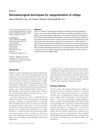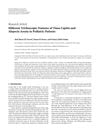 70 citations,
February 2017 in “Dermatologic Surgery”
70 citations,
February 2017 in “Dermatologic Surgery” Treatment with plasma rich in growth factors improved hair density and thickness for hair loss patients.
 66 citations,
February 2013 in “Pediatric Dermatology”
66 citations,
February 2013 in “Pediatric Dermatology” Dermoscopy improves diagnosis and treatment monitoring for children's skin infections, inflammations, and hair disorders.
 60 citations,
April 2006 in “International Journal of Dermatology”
60 citations,
April 2006 in “International Journal of Dermatology” Surgical methods like suction blister grafting and split-thickness skin grafting are highly successful for vitiligo repigmentation, but choosing the right patients is crucial for success.

research Acne
58 citations,
January 1997 in “Dermatologic Clinics” Acne significantly affects mental health and quality of life, with research suggesting hormonal and genetic factors in its development and emphasizing early treatment to prevent scarring.
 53 citations,
March 2010 in “British Journal of Dermatology”
53 citations,
March 2010 in “British Journal of Dermatology” Alopecia common in teens, may indicate endocrine issue, minoxidil effective treatment.
 50 citations,
December 2010 in “Bjog: An International Journal Of Obstetrics And Gynaecology”
50 citations,
December 2010 in “Bjog: An International Journal Of Obstetrics And Gynaecology” South Asian women with PCOS experience more psychological distress and have a poorer quality of life, especially in social relationships, with hirsutism affecting them more than obesity.
 49 citations,
April 2000 in “Journal of The American Academy of Dermatology”
49 citations,
April 2000 in “Journal of The American Academy of Dermatology” Despite progress in treatment, the exact cause of Alopecia areata is still unknown.
 47 citations,
April 2016 in “Lasers in Surgery and Medicine”
47 citations,
April 2016 in “Lasers in Surgery and Medicine” Low-level laser therapy may improve hair regrowth and thickness for androgenetic alopecia, but more research is needed.
 46 citations,
May 2018 in “Dermatologic Surgery”
46 citations,
May 2018 in “Dermatologic Surgery” PRP injections effectively treat hair loss, with positive results in both monthly and every three months treatments.
 45 citations,
September 2018 in “International Journal of Women's Dermatology”
45 citations,
September 2018 in “International Journal of Women's Dermatology” PRP shows promise for hair loss treatment, with three initial monthly injections and maintenance every 3-6 months.
 41 citations,
July 2015 in “Current Drug Discovery Technologies”
41 citations,
July 2015 in “Current Drug Discovery Technologies” Some plants may help with hair growth and have fewer side effects than synthetic drugs, but more research is needed to confirm their effectiveness.
 41 citations,
October 2000 in “Dermatologic clinics”
41 citations,
October 2000 in “Dermatologic clinics” Better hair care products are needed to protect against grooming and chemical damage.
 40 citations,
August 2018 in “Skin appendage disorders”
40 citations,
August 2018 in “Skin appendage disorders” Some alternative treatments for hair loss might work, but more research is needed.
 40 citations,
January 2016 in “Elsevier eBooks”
40 citations,
January 2016 in “Elsevier eBooks” The skin is the largest organ, protecting the body, regulating temperature, and producing hormones.
 37 citations,
October 2014 in “Maturitas”
37 citations,
October 2014 in “Maturitas” Men's hair loss is caused by hormones and genes, and can be treated with medication and surgery, while graying is due to aging and has no prevention except dyeing.
 34 citations,
October 2011 in “Pathology Research International”
34 citations,
October 2011 in “Pathology Research International” Behçet's Disease may be caused by genetic and environmental factors leading to abnormal immune responses, and stress management and new treatments could improve patient outcomes.
 33 citations,
August 2018 in “Facial Plastic Surgery Clinics of North America”
33 citations,
August 2018 in “Facial Plastic Surgery Clinics of North America” The document explains hair biology, the causes of hair loss, and reviews various hair loss treatments.
 32 citations,
March 2019 in “Climacteric”
32 citations,
March 2019 in “Climacteric” Premature ovarian insufficiency (POI) can harm women's sexual health, and they may benefit from hormone therapy and counseling.
 32 citations,
January 2014 in “Dermatology Research and Practice”
32 citations,
January 2014 in “Dermatology Research and Practice” Trichoscopy can effectively tell apart tinea capitis and alopecia areata in children by looking for specific hair shapes.
 32 citations,
June 1976 in “JAMA”
32 citations,
June 1976 in “JAMA” Crash dieting can cause hair loss due to severe calorie restriction.
 31 citations,
May 2008 in “Drug Discovery Today: Disease Mechanisms”
31 citations,
May 2008 in “Drug Discovery Today: Disease Mechanisms” Different hair growth problems are caused by genetic issues or changes in hair growth cycles, and new treatments are being developed.
 30 citations,
December 2017 in “Medical Hypotheses”
30 citations,
December 2017 in “Medical Hypotheses” The model suggests that scalp tension could lead to hair loss, with factors like blood vessel hardening, enlarged oil glands, and poor microcirculation also playing a role. It also hints at a possible link between skull shape and baldness pattern.
 30 citations,
February 2003 in “Annals of Neurology”
30 citations,
February 2003 in “Annals of Neurology” Progesterone and related compounds may help control seizures linked to the menstrual cycle but have limitations that need addressing.
 30 citations,
December 2001 in “Experimental dermatology”
30 citations,
December 2001 in “Experimental dermatology” Gonadal hormones significantly affect the severity of alopecia areata in mice.
 29 citations,
December 2019 in “Stem Cells Translational Medicine”
29 citations,
December 2019 in “Stem Cells Translational Medicine” Fully regenerating human hair follicles not yet achieved.
 29 citations,
March 2019 in “British Journal of Dermatology”
29 citations,
March 2019 in “British Journal of Dermatology” Acne is significantly influenced by genetics, and understanding its genetic basis could lead to better, targeted treatments.
 29 citations,
November 2018 in “Journal of The European Academy of Dermatology and Venereology”
29 citations,
November 2018 in “Journal of The European Academy of Dermatology and Venereology” Personality traits and anxiety affect hair loss patients' quality of life.
 29 citations,
November 2011 in “Veterinary pathology”
29 citations,
November 2011 in “Veterinary pathology” The study found that mouse sweat glands develop before birth, mature after birth, and have specific keratin patterns.
 26 citations,
August 2018 in “American Journal of Clinical Dermatology”
26 citations,
August 2018 in “American Journal of Clinical Dermatology” Hair loss in cancer patients can be related to the cancer itself, treatment, or other conditions, and understanding it is important for diagnosis and patient care.
 26 citations,
June 2016 in “Pediatric Dermatology”
26 citations,
June 2016 in “Pediatric Dermatology” Premature hair graying in young Turkish adults is more likely if they have stress, a family history of graying, drink alcohol, have chronic diseases, are older, or are taller.






























